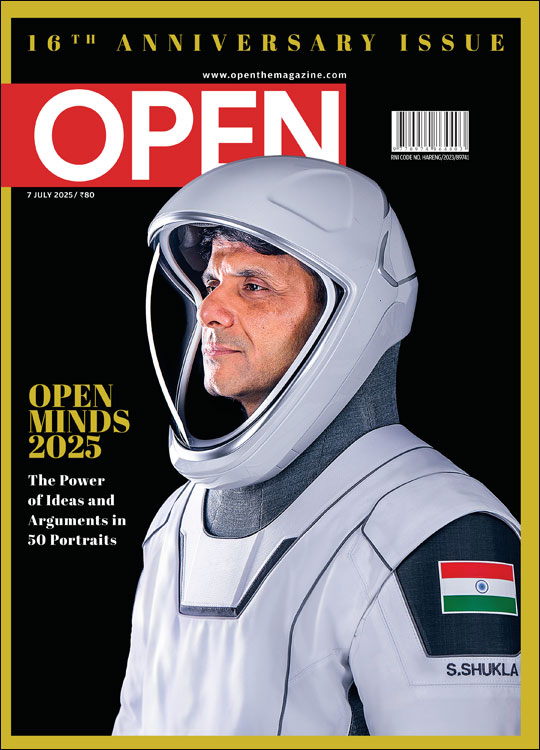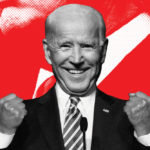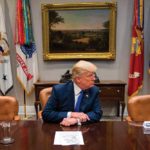President Trump Fires a Missile
Finally America shows global leadership by launching an air strike on Syria. Still, what’s Donald Trump’s strategic vision?
 James Astill
James Astill
 James Astill
James Astill
 |
12 Apr, 2017
|
12 Apr, 2017
/wp-content/uploads/2017/04/Trump2.jpg)
ASKED WHAT HE would do to end Syria’s wretched civil war, Donald Trump until very recently said: “Nothing.” Railing against US involvement in senseless foreign wars was part of his ‘America First’ schtick. Unless there was oil to steal or jihadists to kill—the only possible circumstances in which Trump, on the campaign trail, envisaged taking America to war—he wasn’t interested.
Then why, on April 6th, did Mr Trump launch a salvo of 59 cruise missiles against the Shayrat airbase, in reprisal for President Bashar al-Assad’s latest atrocity, a nerve gas attack in northern Syria that killed over 80 civilians? And what did that mean for American foreign policy? Is the American global policeman, who was, if not semi-retired, then a bit more cautious under Barack Obama, now back on the beat?
The many different explanations Trump’s administration has offered for the strike, which was reported to have disabled a number of Syrian military aircraft, though the airbase itself was quickly repaired, do suggest a momentous change of direction. In announcing the missile strike at his opulent country club in Florida, where he was hosting Chinese President Xi Jinping, Trump gave two, related but distinct, reasons for it. Assad’s regime must be deterred from using chemical weapons for the sake of its many Syrian victims, said Trump. “Even beautiful babies were cruelly murdered in this very barbaric attack. No child of God should ever suffer such horror.” And the Syrian despot must also be deterred for the safety of America: “It is in this vital national security interest of the United States to prevent and deter the spread and use of deadly chemical weapons.”
In the days that followed, Trump’s top lieutenants have suggested the consequences of the strike could be even greater than this. Nikki Haley, the US ambassador to the UN (and, coincidentally, the first Indian American to hold a cabinet rank), has suggested America is now committed to regime change in Syria: “We don’t see a peaceful Syria with Assad there.” Rex Tillerson, the secretary of state, went further: “We rededicate ourselves to holding to account any and all who commit crimes against the innocents anywhere in the world.”
That was strong stuff, especially coming from a former oil company executive who tries to avoid making any sort of public statement where possible, and who, only a couple of days earlier, had suggested America was not interested in removing Assad. At which point Trump’s main spokesman, Sean Spicer, weighed in with an even more specific version of Tillerson’s pledge. “If you gas a baby, if you put a barrel bomb into innocent people, I think you will see a response from this president.”
This was extraordinary. Trump, judged on his campaign rhetoric, is the most selfishly realist president America has ever had. He did not merely criticise America’s 2003 invasion of Iraq, he expressed admiration for the brutal way Saddam Hussein had previously keeping a lid on the place. “Saddam Hussein throws a little gas, everyone goes crazy, ‘Oh, he’s using gas!’” he sneered: “And they were stabilised!” An advocate of water-boarding and smoking out terrorists by killing their families, Trump even proposed some war crimes of his own. Yet if Tillerson is right, Trump, in a truly stunning reversal, has just launched perhaps the most high- minded and interventionist foreign policy America has ever had.
Trump, in a truly stunning reversal, has just launched perhaps the most high-minded and interventionist foreign policy America has ever had
In fact, the president, who brought a sheaf of campaign pledges and no serious plans to the White House, has not formulated any sort of a policy on Syria. He ordered the missile strikes after being genuinely horrified by the images of dead children, victims of Assad’s sarin-gas attack on the town of Khan Shaykhun, he saw on television. According to one of the president’s sons, Eric, he was also persuaded to launch the strike at the request of his daughter and presidential advisor, Ivanka. And if that is right, all power to her. The missile strike was legal and justified; had Barack Obama done similarly, after Assad slaughtered over 1,400 people in a much bigger gas attack in 2013, perhaps the Syrian despot would not have reoffended. Yet Trump’s decision to flip his previous stance on Syria, Assad and the use of force on its head at a moment’s notice was nonetheless illustrative of how chaotic, whimsical and unprepared for the presidency he is.
This is despite a few signs, which the strikes also illustrated, that his administration is becoming more conventional. The president has hired some competent people to his cabinet— including HR McMaster as national security advisor and James Mattis as defence secretary, who were primarily responsible for the Shayrat attack—and they are starting to make their presence felt. The efficient way in which the modest strike was designed and executed was an indicator of that, and there are others. Trump’s bomb-throwing chief strategist, Stephen K Bannon, a right-wing populist whose finger-prints are on most of the administration’s controversial first stabs at immigration and administrative reform, has lost his place at the top tier of the National Security Council. McMaster’s deputy, KT McFarland, an over-promoted Trump loyalist, is in the process of being shunted out altogether. But personnel is not, contrary to the old saw, policy. That needs to come from the president himself, especially in foreign affairs, over which he exercises huge power. And Trump, who is intellectually incurious, reliant on television news for his information and liable to be swayed by the last person he spoke to, has shown little interest in formulating any sort of foreign policy.
He has, for example, said nothing to indicate he has given any thought to the wider ramifications of his military action, or that he plans to follow up on it. It seems increasingly likely that his cabinet members, in trying to second-guess which way the commander-in-chief was blowing on Syria, misjudged him. Having suggested Trump was now committed to ending Assad’s war on his own people, Spicer issued a swift climb- down: “Nothing has changed in our posture. The president retains the option to act in Syria against the Assad regime whenever it is in the national interest.” Trump, in short, reserves the right to do whatever seems best to him, on any given day. That is his prerogative in foreign policy, but it is not a position that lends itself to clear, consistent or predictable action.
Trump has proved his critics wrong far too often to be written off, especially so early in his presidency. There is no reason to think he is losing the confidence of his core supporters. Representing around 35 per cent of the electorate, they appear to be clinging to him ever tighter
TRUMP’S DOMESTIC AGENDA is going much worse— which is another source of modest reassurance, given how awful many of the president’s campaign promises were. Indeed, given his proven appetite for rule-breaking, one of the biggest fears that attended Trump’s election was that America’s system of checks and balances, a power-sharing arrangement between the presidency, judiciary and Congress, constructed in fear of tyrants, might fail to check him. It has long looked threadbare. Envisaged by America’s founding fathers as a consultative and deliberative forum, Congress has become a partisan bear-pit; its members are not minded to check the president when he is of their party—and the Republicans, Trump’s tribe, currently control both its houses.
The judiciary’s ability to check executive excess is also under duress. The powers of the presidency have ballooned in recent decades—in part in response to the dysfunction that partisanship has wrought in Congress—and so has the legal firepower presidents increasingly rely on to get their way. Obama stocked his personal legal firm, the office of the White House counsel, with almost 50 elite lawyers, whose job was to find a legal pretext for whatever the president fancied doing. Yet, despite these reasonable fears—which reach to the heart of American democracy—the constitutional checks on Trump have so far held. He has twice issued edicts banning immigrants from a list of mainly-Muslims countries, apparently to honour a campaign pledge to bar Muslims at the border. The courts have blocked them.
More surprisingly, Congress is also not playing ball with him. Its Republican members could not agree to pass a bill which would have begun dismantling Obama’s healthcare reform, as Trump had urged them to do. There are also signs that twin investigations by members of the House of Representatives and the Senate into Russia’s effort to rig the general election in Trump’s favour, including alleged collusion between Russian officials and members of his campaign team, could be thorough and sincere. The erstwhile chairman of the House probe, a Californian congressman and Trump fan called Devin Nunes, has been forced to recuse himself, following indications that he was taking his orders from the White House. The Senate investigation, which will involve a handful of powerful Republican congressman, such as John McCain and Marco Rubio, who have little love for the president, looks serious.
The result of these checks is that Trump is approaching the first 100 days of his presidency—a landmark, due on April 29th, against which significant executive progress is traditionally expected—without having achieved much of anything. Among his rotten campaign pledges, his vow to build a southern border-wall is also unlikely to be fulfilled. Even if Congress would furnish the president with the necessary billions of dollars, which seems unlikely, it is unclear how Trump would secure access to the vast tranches of privately-own land that extend along much of the 3,200-km border, or where he would place the wall in Texas, where much of the frontier is demarcated by the Rio Grande river. No doubt, there will be some additional fencing in places; but, admits Trump’s homeland secretary chief, John Kelly, “It is unlikely that we will build a wall, a physical barrier, from sea to shining sea.”
The Republican legislative agenda, which dove-tails with Trump’s promises to launch a new health care system, reform the tax system and rebuild America’s creaky infrastructure, is also in trouble. Health-care reform is stalled. So is tax reform, mainly due to intra-Republican disagreement over the merits of a proposed border-adjustment tax, a would-be reform of corporate taxation, which is needed to provide revenue for the massive tax cuts Trump and his party have promised. Without substantial tax reform, the Republicans will probably have to fall back on more modest, and unfunded, tax cuts, which will be bad news for America’s ballooning budget deficit—and worse for Trump’s prospect of gaining congressional support for a major splurge on infrastructure.
Nothing is certain about Trump; he has proved his critics wrong far too often to be written off, especially so early in his presidency. Importantly, moreover, there is no reason to think he is losing the confidence of his core supporters. Representing around 35 per cent of the electorate, they appear to be clinging to him ever tighter. By historical standards, however, his presidency is in deep trouble. His approval ratings are dire. Barely 40 per cent of Americans—that is, almost no one outside that core group—thinks he is doing a good job. He has achieved nothing significant. His fledgling administration, despite the progress of its few acknowledged stars, has a reputation for scandal and sudden staff changes—partly due to the sacking of McMaster’s short-lived predecessor, Mike Flynn, after he was revealed to have lied about secretive discussions with the Russian ambassador. And it seems likely that, besides McFarland, one or two other senior officials will also be headed for the exit. Trump’s two top advisors, Bannon and Jared Kushner, the president’s son-in-law, are at each other’s throats. That is a fight that only Kushner seems able to win—those who hope for a more conventional presidency would be relieved by his victory. And yet the loss of Bannon, a rare ideological advocate of Trumpism, would raise renewed questions about what this strange presidency is actually for.
This is the messy context in which the president’s decision to launch missiles last week took place. It perhaps helps explain why Trump’s lieutenants, badly in need of some positive news coverage, over-egged the policy implications of that modest strike. And it should make clear that Trump had no coherent Syria strategy in mind when he ordered it. It might also suggest how badly the president is in need of some success—and by bombing Syria, for laudable moral reasons, he has just won the first time bipartisan plaudits of his presidency. Given Trump’s flexibility on the issue of military force, that is a slightly troubling combination.

/wp-content/uploads/2025/06/Cover-OpenMinds2025.jpg)













More Columns
Puri Marks Sixth Major Stampede of The Year Open
Under the sunlit skies, in the city of Copernicus Sabin Iqbal
EC uploads Bihar’s 2003 electoral roll to ease document submission Open